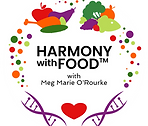5 Things Big Pharma Doesn't Want You to Know About Micronutrients
- Meg O'Rourke
- Mar 29, 2023
- 2 min read
This week on the Harmony With Food Radio Show, I talked about micronutrients and dove into 5 which aren't often tested by your doctor. Learn which ones they are, what side effects you may have if you're depleted, and what foods to eat to get more nutrients.
Vitamin A
Vitamin A is in the fat-soluble vitamin group and it includes retinol, retinoic acid, and several Vitamin A carotenoids, among which betaine is the most important.
Effects of Depleted Vitamin A
When someone is low in Vitamin A it can result in:
Night blindness
Impaired immunity
Impaired wound healing
Increased risk of infection
Thyroid disorders
Keratosis, a skin disorder
Food Sources of Vitamin A
Here's where you can find more Vitamin A:
Meat: turkey, beef, pork, fish, and chicken
Orange fruits and vegetables: butternut squash, sweet potatoes, pumpkins, carrots, canteloupe, and mangoes.
Green vegetables: dandelion greens, spinach, broccoli, and kale.
Fortified grains
Vitamin B6
B6 is very important in the metabolism of certain enzymes and protein. It also aids in the absorption of B12, which is more commonly checked than B6. It is involved in the methylation cycle and clearance of homocysteine as well as folate.
Effects of Depleted Vitamin B6
If you're depleted in Vitamin B6, you may have the following side effects:
A build-up protein (amyloidosis)
Growth failure
Immune dysfunction
Microcytic anemia, which means your red blood cells are too small
Depression, fatigue, and anxiety
Pregnancy, birth control, amphetamines, and smoking can all affect your B6 levels.
Sources of B6
Here's where you can get more B6:
Legumes - including beans, lentils, and soybeans
Whole grains
Nuts and seeds
Non-citrus fruits
Beef and poultry
Fish
Liver
Vitamin D
Vitamin D is a very important vitamin that is frequently checked by doctors, but did you know there's more than one type of Vitamin D? You need both Vitamin D2 and Vitamin D3, but more often than not doctors are only checking D2.
Conditions Associated with Vitamin D Deficiency
Vitamin D is well-researched and has been associated with the following disorders:
Alzheimer's Disease
Ashtma
Autism
Cancer
Cavities
Colds & flu
Cystic fibrosis
Dementia
Depression
Diabetes Type 1 & 2
Eczema
Psoriasis
Hearing Loss
Heart Disease
Hypertension
Infertility
Inflammatory Bowel Disease
Sources of Vitamin D
Vitamin D can be increased through sun exposure. If you live in a cold climate it is often recommended that you supplement with Vitamin D, but I always recommend getting tested first to make sure you are taking the right amount! You can also get more Vitamin D through the following sources:
Dairy products
Salmon
Mackerel
Shrimp
Mushrooms
Baker's Yeast
Egg yolks
Inositol
Inositol derivatives are used in the cellular signaling process after the insulin receptor is activated. It is crucial for the development of peripheral nerves and it helps move fats out of the liver. It promotes the production of lecithin and helps prevent plaque buildup.
Signs of Inositol Depletion
Here are some signs you don't have enough inositol:
Depression and anxiety
Polycystic Ovarian Syndrome (PCOS)
Diabetes
Cardiovascular Disease
Obesity
Sources of Inositol
Inositol can be found in the following foods:
Cantaloupe
Oranges
Prunes
Navy beans
Grapefruit
Limes
Blackberries
Kiwi
Green beans
What is your nutrient status?
Ready to go beyond Vitamin D and get a full picture of your health? Schedule a free call with me to talk about micronutrient testing, which tests over 35 nutrients. Once you get your results, I'll create a customized food supplement plan for you to get you back to feeling your best.




.png)


























Comments